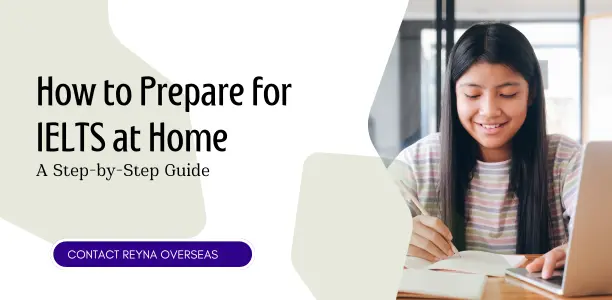
How to Prepare for IELTS at Home: A Step-by-Step Guide
Have you been planning to take your IELTS test and don’t know where to start? Preparing for the IELTS (International English Language Testing System) can be a daunting task, especially if you’re doing it at home. However, with the right strategy, resources, and dedication, you can effectively prepare for the test on your own. This step-by-step guide will provide you with essential tips, strategies, and mock tests to help you prepare for IELTS at home.
Step 1: Pick the Right IELTS Test for You
Before diving into your preparation, determine which IELTS test is appropriate for your goals. There are three main types of IELTS tests:
- IELTS Academic: Ideal for those planning to pursue higher education or seek professional registration in an English-speaking country.
- IELTS General Training: Suitable for those who wish to study at a vocational level or migrate to English-speaking countries like Australia, New Zealand, Canada, or the UK.
- IELTS Life Skills: Required for specific visa applications in the UK, including indefinite leave to remain or citizenship.
Understanding which test you need is crucial as it will shape your preparation approach.
Step 2: Get Familiar with the Test Format
Once you’ve selected the appropriate test, familiarize yourself with its format, including question types and test patterns. Both the IELTS Academic and General Training tests consist of four sections: Listening, Reading, Writing, and Speaking. Each section assesses different skills and has its unique question types.
- Listening: 4 sections, 40 questions
- Reading: 3 sections, 40 questions
- Writing: 2 tasks
- Speaking: 3 parts
Understanding the format and requirements of each section will help you strategize your preparation effectively.
Listening Preparation
The Listening section consists of four recordings. Here’s how to prepare:
- Practice Listening Skills: Engage with various English audio materials, such as podcasts, news broadcasts, and audiobooks. This will help you acclimatize to different accents and speaking styles.
- Take Notes: While practicing, develop your note-taking skills to capture essential details.
- Familiarize with the Test Format: Listen to practice tests to get used to the types of questions asked and the timing.
Reading Preparation
The Reading section contains three passages with different focuses. Preparation tips include:
- Read Widely: Explore different genres, including newspapers, magazines, and academic articles, to enhance your reading skills.
- Practice Skimming and Scanning: Learn to quickly identify key information and themes in texts.
- Timed Practice: Regularly practice under timed conditions to improve your speed and comprehension.
Writing Preparation
The Writing section consists of two tasks. Here’s how to prepare:
- Practice Writing Essays: Write essays on various topics, ensuring you structure your arguments clearly with an introduction, body paragraphs, and a conclusion.
- Analyze Sample Responses: Review high-scoring sample essays to understand the criteria for effective writing.
- Get Feedback: Share your writing with friends or teachers to receive constructive feedback.
Speaking Preparation
The Speaking section involves a face-to-face interview with an examiner. To prepare:
- Practice Speaking Regularly: Engage in conversations with English speakers or practice speaking on various topics.
- Record Yourself: Record your responses and listen to identify areas for improvement.
- Use Speaking Prompts: Utilize IELTS speaking prompts to practice answering questions in a structured way.
Step 3: Understand the Band Scoring System
Your IELTS results will be provided as band scores, ranging from 0 to 9, with each score corresponding to a level of English proficiency. Knowing the scoring criteria is essential for focused preparation. Familiarize yourself with what is expected for each band level to set realistic goals.
Step 4: Assess Your Current English Proficiency
Evaluate your current English skills across the four sections: Listening, Reading, Writing, and Speaking. Identify your strengths and weaknesses. For instance, if you excel in reading but struggle with speaking, allocate more time to improving your speaking skills. This self-assessment will guide your study plan.
Step 5: Set Realistic Goals and Create a Study Schedule
Establish achievable goals for your IELTS preparation and develop a study schedule. Self-study is crucial when preparing for the IELTS at home. Here’s how to create an effective study plan:
- Break Down Your Study Sessions: Dedicate specific days to each skill (Listening, Reading, Writing, Speaking) and rotate them throughout the week.
- Set Milestones: Create weekly or bi-weekly milestones to track your progress.
- Incorporate Variety: Use a mix of study materials—videos, online courses, practice tests, and textbooks—to keep your study sessions engaging.
Step 6: Utilize Effective Resources
Leverage a variety of resources for IELTS preparation. Official IELTS materials, study guides, and online platforms are invaluable. Here’s how to make the most of them:
- Use Official Practice Tests: These are crucial for understanding the exam format and timing.
- Explore Online Learning Platforms: Websites and apps offer free resources and practice tests.
- Consider Study Guides: Invest in reputable IELTS preparation books recommended by successful test-takers.
Step 7: Develop Test-Taking Strategies
As your test date approaches, focus on mastering test-taking strategies. Here are some key tips:
- Manage Your Time: During practice tests, keep track of time to ensure you can complete all sections within the allotted duration.
- Familiarize with Different Question Types: Practice strategies for various question types, such as multiple-choice, matching, or fill-in-the-blank.
- Stay Calm and Confident: Test anxiety can affect performance. Practice relaxation techniques and visualization to boost your confidence.
Step 8: Take Mock Tests
Mock tests simulate the actual exam environment and help you gauge your readiness. Here’s how to utilize mock tests effectively:
- Regularly Schedule Mock Tests: Conduct full-length tests under timed conditions.
- Review Your Performance: After each mock test, analyze your answers, identify mistakes, and note patterns in errors.
- Seek Feedback: Consider sharing your mock test results with a tutor or mentor for constructive feedback.
Step 9: Review and Revise
Continuous review and revision are essential for reinforcing your learning. Regularly revisit challenging topics, vocabulary, or question types. Consider these tips:
- Create Flashcards: Use flashcards for vocabulary, grammar rules, and essential phrases to enhance memory retention.
- Engage in Group Study: Join study groups to discuss topics and quiz each other.
- Utilize Revision Techniques: Spaced repetition and active recall can enhance your retention of information.
Step 10: Prepare for Test Day
To ensure a smooth experience on the test day, consider the following preparations:
- Arrive Early: Plan to arrive at the test center with plenty of time to spare for registration and seating.
- Check Required Documents: Ensure you bring valid identification and any other necessary documents.
- Stay Calm: Practice relaxation techniques on the test day to manage anxiety.
Conclusion
Preparing for the IELTS at home is a structured process that requires dedication, time management, and effective strategies. By following this comprehensive guide, you can approach the exam with confidence. Remember, the IELTS journey is a marathon, not a sprint. Stay focused on your study plan, utilize online resources, and celebrate your progress along the way.
At Reyna Overseas, we’re committed to helping you achieve your desired IELTS band score. With expert guidance, personalized study plans, and a supportive environment, you’ll feel confident and prepared on exam day. We also offer online IELTS applications for practice, providing free mock tests to enhance your preparation. If you prefer in-person learning, you can join our offline coaching sessions as well. Start your IELTS journey with us today!



